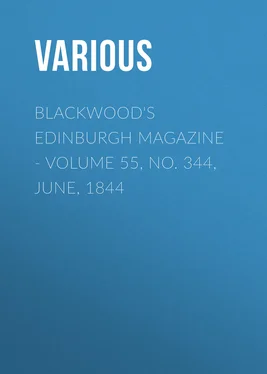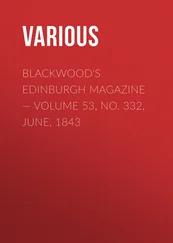Various - Blackwood's Edinburgh Magazine. Volume 55, No. 344, June, 1844
Здесь есть возможность читать онлайн «Various - Blackwood's Edinburgh Magazine. Volume 55, No. 344, June, 1844» — ознакомительный отрывок электронной книги совершенно бесплатно, а после прочтения отрывка купить полную версию. В некоторых случаях можно слушать аудио, скачать через торрент в формате fb2 и присутствует краткое содержание. Издательство: Иностранный паблик, Жанр: foreign_antique, periodic, foreign_edu, на английском языке. Описание произведения, (предисловие) а так же отзывы посетителей доступны на портале библиотеки ЛибКат.
- Название:Blackwood's Edinburgh Magazine. Volume 55, No. 344, June, 1844
- Автор:
- Издательство:Иностранный паблик
- Жанр:
- Год:неизвестен
- ISBN:нет данных
- Рейтинг книги:4 / 5. Голосов: 1
-
Избранное:Добавить в избранное
- Отзывы:
-
Ваша оценка:
- 80
- 1
- 2
- 3
- 4
- 5
Blackwood's Edinburgh Magazine. Volume 55, No. 344, June, 1844: краткое содержание, описание и аннотация
Предлагаем к чтению аннотацию, описание, краткое содержание или предисловие (зависит от того, что написал сам автор книги «Blackwood's Edinburgh Magazine. Volume 55, No. 344, June, 1844»). Если вы не нашли необходимую информацию о книге — напишите в комментариях, мы постараемся отыскать её.
Blackwood's Edinburgh Magazine. Volume 55, No. 344, June, 1844 — читать онлайн ознакомительный отрывок
Ниже представлен текст книги, разбитый по страницам. Система сохранения места последней прочитанной страницы, позволяет с удобством читать онлайн бесплатно книгу «Blackwood's Edinburgh Magazine. Volume 55, No. 344, June, 1844», без необходимости каждый раз заново искать на чём Вы остановились. Поставьте закладку, и сможете в любой момент перейти на страницу, на которой закончили чтение.
Интервал:
Закладка:
Since fairies, like ourselves, are mortal, two lives may be understood as at stake in the following:—
“Some hundred years ago, there lived at Calb, in the Werder, an aged lady of the house of Alvensleben, who feared God, was gracious to the people, and willingly disposed to render any one a service: especially she did assist the burgesses’ wives in difficult travail of childbirth, and was, in such cases, of all desired and highly esteemed. Now, therefore, there did happen in wise following:—
“In the night season there came a damsel to the castle gate, who knocked and distressfully called, beseeching that it should not mislike her, if possible, forthwith to arise, and to accompany her from the town, where there lay a good woman in travail of child, because the last hour and uttermost peril was already upon her, and her mistress wist no help for her life. The noblewoman said, ‘It is very midnight; all the town gates be shut and well barred: how shall we make us forth?’ The damsel rejoined that the gate was ready open, she should come forth only, (but beware, as do some add, in the place whither she should be conducted, to eat or to drink any thing, or to touch that should be proffered her.) Thereupon did the lady rise from her bed, dressed her, came down, and went along with the damsel which had knocked. The town gate she found open, and as they came further into a field was there a fair way which led right into a hillside. The hill stood open, and although she did well perceive that the thing was darksome, she resolved to go still on, unalarmed, until she arrived at last where was a little wifikin that lay on the bed, in great pains of travail. But the noble lady gave her succour, (by the report of some, she needed no more than lay her hand upon her body ,) and a little baby was born to the light of day.
“When she had yielded her aid, desire took her to return from out the hill, home; she took leave of the sick woman, (without having any thing touched of the meats and liquors that were offered her,) and the former damsel anew joined her, and brought her back unharmed to the castle. At the gateway the damsel stood still, thanked her highly in her mistress’s name, and drew off from her finger a golden ring, which she presented to the noblewoman with these words, ‘Have this dear pledge in right heedful keeping, and let it not part from you and from your house. They of Alvensleben will flourish so long as they possess this ring. Should it ever leave them, the whole race must become extinct.’ Herewith vanished the damsel.
“It is said that the ring, at this day, is rightly and properly kept in the lineage, and for good assurance deposited at Lubeck. But others, that it was, at the dividing of the house into two branches, diligently parted in two. Others yet, that the one half has been melted, since when it goes ill with that branch: the other half stays with the other branch at Zichtow. The story moreover goes, that the benevolent lady was a married woman. When she upon the morrow told her husband the tale of that had betid her in the night, he would not believe her, until she said, ‘Forsooth, then, an’ ye will not trow me, take only the key of yon room from the table: there lieth, I dare warrant, the ring.’ Which was exactly so. It is marvellous the gifts that men have received of the fairies.”
The most touching by far of the traditions at our disposal for illustrating at once the dependence of the fairies upon man, and their anxiety concerning their souls’ welfare, is one in which the all-important hope which we have said that they sometimes solicit from the grave and authorized lips of priests, appears as floating on the lightest breath of children. Our immediate author is James Grimm, speaking in his German Mythology of the water spirit. The tradition itself is from Sweden, where this mythological being, the solitary water fairy, bears the name of “The Neck .”
“Two lads were at play by the river side. The Neck sate and touched his harp. The children called to him—
“‘Why sittest thou here, Neck , and playest? Thou wilt not go to heaven.’ Then the Neck began bitterly weeping, flung his harp away, and sank in the deep water. When the boys came home they told their father, who was a priest, what had happened. The father said—
“‘Ye have sinned towards the Neck . Go ye back, and give him promise of salvation.’
“When they returned to the river, the Neck sate upon the shore, mourning and weeping. The children said—
“‘Weep not so, thou Neck . Our father hath said, that thy Redeemer too liveth.’
“Then the Neck took joyfully his harp, and played sweetly until long after sundown.”
“I do not know,” tenderly and profoundly suggests Dr Grimm, “that any where else in our traditions is as significantly expressed how needy of the Christian belief the Heathen are, and how mildly it should approach them.”
III. A few words shall here satisfy the claims of a widely-stretching subject. Is there one order of spirits which, as the Baron Walckenaer has assured us, lavishes on chosen human heads love unattracted, and hate unprovoked? We must look well about us ere fixing the imputation. Spirits, upon the other hand, undoubtedly there are, and those of not a few orders, fairies of one or another description being amongst them, who exert, in the choice of their human favourites, a discrimination challenging no light regard.
A host of traditions, liberally scattered over a field, of which, perhaps, Ireland is one extremity and China the other, now plainly and emphatically declare, and now, after a venturous interpretation, may be understood to point out, simplicity of will and kindness of heart as titles in the human being to the favour of the spirits. At times a brighter beam irradiates such titles, to which holiness, purity, and innocence, are seen to set their seal. We cull a few instances, warning the reader, that, although of our best, he will possibly find them a mere working upwards to the most perfect which we have it in our power to bring before him in the beautiful tale of Maud.
Amongst the searchers who seem to have been roused into activity by the German traditions of the brothers Grimm, Ludwig Bechstein takes distinguished place for the diligence with which he has collected different districts of Germany. Our inquiry shall owe him the two following
“There prevails, concerning the ruins of the old hill-castle Raueneck, a quite similar tradition to that which holds of the like named ruined strength near Baden, in Austria. There lies yet buried here a vast treasure, over which a spirit, debarred from repose, keeps watch, anxiously awaiting deliverance. But who is he that can and shall actually lift this treasure and free the spirit? Upon the wall there grows a cherry seedling that shall one day become a tree; and the tree shall be cut down, and out of it a cradle made. He that, being a Sunday’s child, is rocked in this cradle, will grow up, but only provided that he have kept himself virginally pure and chaste, at some noontide hour set free the spirit, lift the treasure, and become immeasurably rich; so as he shall be able to rebuild Castle Raueneck and all the demolished castles in the neighbourhood round. If the plant wither, or if a storm break it, then must the spirit again wait until once more a cherry stone, brought by a bird to the top of the lofty wall, shoot and put forth leaves, and haply grow to a tree.”
“In the wood near Altenstein there stands a high rock. The inhabitants of the neighbourhood say that this rock is hollow within, and filled with treasure in great store from the olden time. At certain seasons and hours, it is given to Sunday children to find the rock doors open, or to open them with the lucky flower .”
Читать дальшеИнтервал:
Закладка:
Похожие книги на «Blackwood's Edinburgh Magazine. Volume 55, No. 344, June, 1844»
Представляем Вашему вниманию похожие книги на «Blackwood's Edinburgh Magazine. Volume 55, No. 344, June, 1844» списком для выбора. Мы отобрали схожую по названию и смыслу литературу в надежде предоставить читателям больше вариантов отыскать новые, интересные, ещё непрочитанные произведения.
Обсуждение, отзывы о книге «Blackwood's Edinburgh Magazine. Volume 55, No. 344, June, 1844» и просто собственные мнения читателей. Оставьте ваши комментарии, напишите, что Вы думаете о произведении, его смысле или главных героях. Укажите что конкретно понравилось, а что нет, и почему Вы так считаете.












